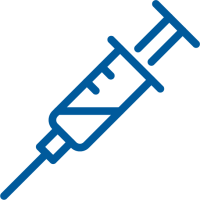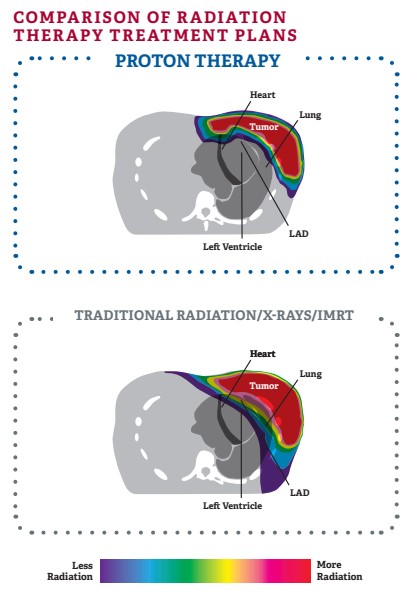Proton therapy for breast cancer
- Maintains quality of life
- Lower risk of side effects
- Decreased impact on surrounding tissue
- Reduced radiation exposure
- Controlled placement & dosage
- Treatment of complex tumors
- Treatment near sensitive organs
Precise Cancer Treatment
Cancer Treatment that allows patients to maintain their quality of life by reducing risks of side effects.
Proton therapy is an advanced form of radiation therapy that precisely treats the tumor using proton particles instead of x-rays. Protons do not deposit radiation beyond the tumor they are targeting, causing less damage to healthy tissue. Reducing unnecessary radiation results in fewer treatment-related side effects.
A care coordinator will contact you by phone during normal business hours.
Proton Therapy for Breast Cancer
Precise Cancer Treatment
Cancer Treatment that allows patients to maintain their quality of life by reducing risks of side effects.
Proton therapy is an advanced form of radiation therapy that precisely treats the tumor using proton particles instead of x-rays. Protons do not deposit radiation beyond the tumor they are targeting, causing less damage to healthy tissue. Reducing unnecessary radiation results in fewer treatment-related side effects.
A care coordinator will contact you by phone during normal business hours.
Proton Therapy for Breast Cancer

Effective treatment for breast cancer
Proton therapy is an excellent treatment option for patients who are concerned about potential side effects from radiation treatment. Compared to intensity modulated radiation therapy (IMRT) and 3-D conformal radiotherapy (3-D CRT), the radiation dose to the heart and lungs can be significantly reduced when treating breast cancer with proton therapy. In many cases, the impact on the heart from proton therapy can be the same as women who have never received radiation therapy.

Precise treatment with fewer side effects
Proton Therapy is an advanced form of radiation therapy that precisely targets the tumor utilizing proton particles. Proton particles stop inside the body and do not deposit radiation beyond the tumor they are targeting, causing less damage to healthy tissue. Proton therapy is effective in treating a broad range of tumors including prostate, head and neck, central nervous system, lung, breast, gynecologic, sarcoma, gastrointestinal, pediatric cancers, and others.

Maintain quality of life during & after treatment
Because proton therapy reduces treatment-related side effects, most patients are able to maintain their levels of pre-treatment activity throughout treatment.

- 88% less radiation dose to the heart for left-sided breast cancer
- 44% reduction in clinically significant radiation doses to the lung
- 90% of partial breast irradiation cases result in good to excellent cosmetic outcomes at five years
- Well tolerated with less than 4% serious side effects (grade 3) in locally advanced breast cancer
In a study of women with locally advanced, left-sided breast cancer post-mastectomy, proton therapy showed excellent sparing of the heart and the lung, potentially decreasing the risk of side effects.
Proton therapy may be a better option for breast cancer patients who:
- Have Stages I-III breast cancer, especially if the cancer is located on the left side of the body
- Will undergo lymph node irradiation as part of a treatment plan
- Will receive chemotherapy
- Have preexisting vascular disorders, cardiac disease, lung disease or an increased risk of developing a secondary malignancy
- Have unfavorable anatomy that places normal organs at an elevated risk of radiation exposure

Breast Cancer treatment with protons compared to treatment with conventional radiation/X-rays/IMRT
Proton therapy has unique attributes that reduce radiation exposure to normal, healthy organs. This is important for either breast with respect to sparing damage to the lungs, but especially important in left-sided breast cancer, as the cancer is close to critical organs such as the heart and important blood vessels like the left anterior descending artery (LAD), which feeds most of the left side of the heart.

What is proton therapy?
Proton therapy uses charged particles (protons) rather than x-rays to selectively destroy cancer cells. This results in excellent rates of cancer control with a much lower risk of side effects compared with other forms of radiation therapy.
What makes proton therapy different?
Proton therapy is a highly advanced and extremely precise form of radiation. The physical properties of protons, described by the Bragg-Peak (Figure 1 down below on page), and the increased conformality of pencil beam scanning make it possible to spare healthy surrounding organs from unnecessary radiation exposure during treatment.
Why is this important?
When treating breast cancer with proton therapy, surrounding tissue and vital organs such as the heart and lungs are exposed to far less radiation than standard therapy. Therefore, women treated with proton therapy experience fewer side effects and an improved quality of life during and after treatment.
Is proton therapy effective?
Yes! Many clinical studies have demonstrated the effectiveness of proton therapy for treating breast cancer.
Less radiation, better quality of life
Proton therapy deposits less radiation dose before reaching the tumor, then deposits the prescribed dose within the tumor, and has no exit dose.
X-ray radiation must start with a higher dose that gradually declines to the prescription dose at the tumor, then continues to deposit radiation in healthy surrounding tissue as it exits the body.

Committed to our cause since 1985
The Thompson Cancer Survival Center Story
World-Class treatment, right in Knoxville, TN
Thompson Proton Center is one of less than 50 proton centers in the entire world. And, we’re proud to be members of Thompson Cancer Survival Center, where leading cancer specialists use the most advanced technologies and treatment methods to achieve breakthrough successes. Our network of cancer care providers are supported by a team of patient navigators, oncology pharmacists, dietitians, genetics counselors, clinical trials experts, physicists, therapists, technologists, and nurses with one goal: to treat and beat your cancer.
Our leading oncologists
You’re in good hands with Thompson Proton Center

Radiation Oncologist
and Medical Director
Ryan Grover, MD
Residency:
Radiation Oncology
Loma Linda University Medical Center
Medical School:
University of Southern California

Radiation Oncologist
Brion Shin, MD
Residency:
Radiation Oncology
Loma Linda University Medical Center
Medical School:
Loma Linda University Medical Center

Radiation Oncologist
Allen Meek, MD
Residency:
Radiation Oncology
Johns Hopkins University
Medical School:
Johns Hopkins University
- Fill in our quick form
- A care coordinator will contact you by phone during normal business hours.
- We’ll take the time to listen and plan the next steps
A care coordinator will contact you by phone during normal business hours.

